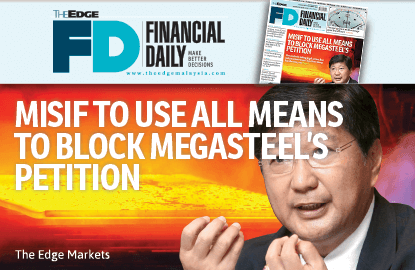
This article first appeared in The Edge Financial Daily, on December 30, 2015.

KUALA LUMPUR: Iron and steel makers said yesterday that they are prepared to use all means, including legal action, to block a petition by Megasteel Sdn Bhd to impose safeguard duties on the imports of hot-rolled coils (HRCs) at the rate of 40% on top of the existing 15% import duty on the steel.
As the date for the release of a preliminary determination report with regard to the anti-dumping investigation into imports of HRCs by the Ministry of International Trade and Industry (Miti) nears, the Malaysian Iron and Steel Industry Federation (Misif) is going all out to make sure it is favourable to its members.
The report is due out on Jan 8, 2016.
Speaking at a press conference yesterday, Misif president Datuk Soh Thian Lai once again slammed Megasteel’s petition requesting the government to impose safeguard duties on the imports of HRCs as “without merits” and “unsustainable”.
He said any imposition of safeguard measures and further protection measures in the form of a proposed special purpose vehicle to bail out an insolvent company like Megasteel runs contrary to the country’s public interest.
“Given the far-reaching implications of this matter, we wish to reiterate that Misif is willing, able and ready to resort to all available legal avenues to protect the Malaysian iron and steel industry’s interest,” he warned, adding that it will pursue legal action only as a last resort.
“For foreign [steel] players, whose governments are member states of the World Trade Organization (WTO), they can file their case to the global trade body,” Soh added.
Nevertheless, Soh said Misif is “cautiously optimistic” that Miti will decide not to impose a provisional measure on the importation of HRCs.
Megasteel, which is controlled by tycoon Tan Sri William Cheng through Lion Corp Bhd, is seeking trade remedial measures for HRC production from the government as it has been affected by an oversupply situation due to excessive dumping.
This is not the first attempt by Megasteel to request for safeguard measures. In 2011, Megasteel petitioned for safeguard duties to be imposed on HRC imports, but it failed.
Soh said it is no secret that Megasteel does not have the capabilities of producing and supplying the full range of HRCs required by the domestic market, hence the need for duty-exempted HRC imports.
“The government has provided various protection to Megasteel since its inception, but Megasteel is still asking for more. Despite all the protection given for the past 15 years, Megasteel is now an insolvent company with RM3.02 billion debts,” he noted.
Soh also pointed out that HRCs sold by Megasteel are consistently above the world average HRC price and most domestic industries are forced to purchase at least 50% of their HRC needs from Megasteel.
Misif legal counsellor Jason Teoh Choon Hui said if Miti’s preliminary determination report found that there is sufficient evidence to impose a provisional measure on HRC imports, steel players will still have a small window to raise their objections within the investigation mechanism before the final decision is made.
“Interested parties can take the matter for judicial review or foreign exporters can go through their governments to engage with the Malaysian government. Eventually, it is possible to take the case to the WTO,” he said.
Teoh also highlighted that foreign steel exporters are observing the matter with concern as it will affect foreign investments in Malaysia.
“In business, we need certainty, so we hope Miti will be consistent in its decision,” he said.
Meanwhile, Soh said the price hike of natural gas by 17.1% starting January is expected to add a burden on steel makers by incurring an extra cost of RM150 million per year.
“For every tonne of steel, we consume 4-7 mmBtu (one million British thermal units) of gas. With the 17% increase in gas tariff, it will cost about 6% increase in production.
“Overall, for the steel industry, it will cost about RM150 million per year,” he said.
Despite facing cost challenges, he expects the domestic steel industry to grow at least 1% next year, underpinned by domestic infrastructure projects and the realisation of the Asean Economic Community, which encourages more exports among Asean countries.
“The industry’s average growth is about 1% to 3%. Based on the government’s economic growth forecast of 4% to 5%, growth in the steel industry will remain,” he said.